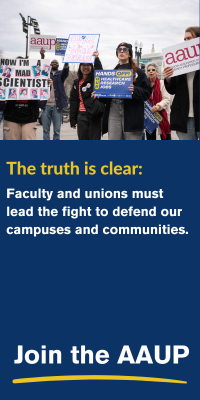- About
- Programs
- Issues
- Academic Freedom
- Political Attacks on Higher Education
- Resources on Collective Bargaining
- Shared Governance
- Campus Protests
- Faculty Compensation
- Racial Justice
- Diversity in Higher Ed
- Financial Crisis
- Privatization and OPMs
- Contingent Faculty Positions
- Tenure
- Workplace Issues
- Gender and Sexuality in Higher Ed
- Targeted Harassment
- Intellectual Property & Copyright
- Civility
- The Family and Medical Leave Act
- Pregnancy in the Academy
- Publications
- Data
- News
- Membership
- Chapters
Expanding Union Rights in Public Higher Education
Faculty collective bargaining rights in the public sector are dependent on state law. In states without enabling legislation for faculty collective bargaining—including some that are otherwise friendly to organized labor—college and university administrations are not compelled to recognize faculty unions or to come to the bargaining table, and faculty members seeking to bargain collectively have no recourse to state labor boards. As interest in unionization grows at higher education institutions of all kinds, struggles over the future of faculty collective bargaining are being waged in statehouses around the country.
The articles that follow consider four states—Nevada, Colorado, Wisconsin, and Maryland—where faculty are seeking to gain, expand, or restore union rights. The political context in each state is unique, and the obstacles to collective bargaining differ, but sustained organizing efforts in all of these states have created opportunities to expand union rights at public colleges and universities.
Barriers to Collective Bargaining for Higher Education Professionals in Nevada
By Kent Ervin and Alissa Surges
Organizing for Collective Bargaining in Colorado
By Jonathan Rees
The Battle for Higher Education in Wisconsin
By Jon Shelton
The Ongoing Fight for Faculty Collective Bargaining in Maryland
By Jonn Mack



